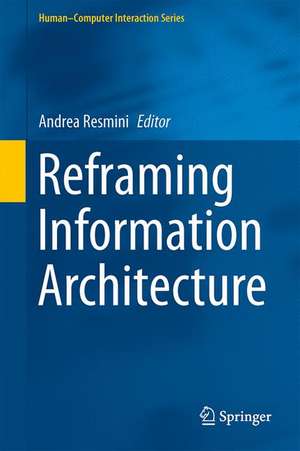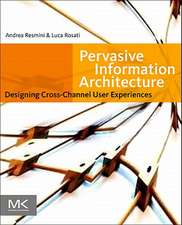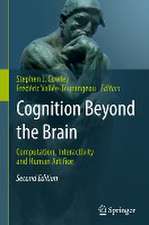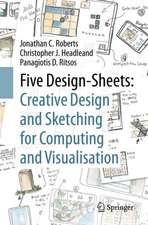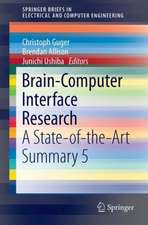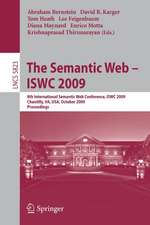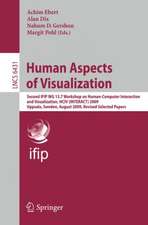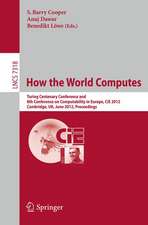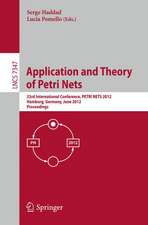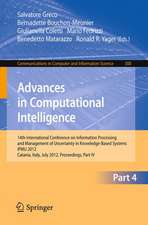Reframing Information Architecture: Human–Computer Interaction Series
Editat de Andrea Resminien Limba Engleză Hardback – 29 iul 2014
Via narratives, frameworks, references, approaches and case-studies this book explores these changes and offers a way to reconceptualize the shifting role and nature of information architecture where information permeates digital and physical space, users are producers and products are increasingly becoming complex cross-channel or multi-channel services.
| Toate formatele și edițiile | Preț | Express |
|---|---|---|
| Paperback (1) | 326.28 lei 43-57 zile | |
| Springer International Publishing – 17 sep 2016 | 326.28 lei 43-57 zile | |
| Hardback (1) | 332.39 lei 43-57 zile | |
| Springer International Publishing – 29 iul 2014 | 332.39 lei 43-57 zile |
Din seria Human–Computer Interaction Series
- 20%
 Preț: 655.85 lei
Preț: 655.85 lei - 20%
 Preț: 309.27 lei
Preț: 309.27 lei - 20%
 Preț: 375.54 lei
Preț: 375.54 lei - 20%
 Preț: 644.48 lei
Preț: 644.48 lei - 20%
 Preț: 667.75 lei
Preț: 667.75 lei - 20%
 Preț: 664.44 lei
Preț: 664.44 lei - 20%
 Preț: 1164.84 lei
Preț: 1164.84 lei - 20%
 Preț: 817.55 lei
Preț: 817.55 lei - 20%
 Preț: 657.16 lei
Preț: 657.16 lei - 20%
 Preț: 645.31 lei
Preț: 645.31 lei - 20%
 Preț: 938.66 lei
Preț: 938.66 lei - 15%
 Preț: 658.05 lei
Preț: 658.05 lei - 20%
 Preț: 822.51 lei
Preț: 822.51 lei - 20%
 Preț: 654.21 lei
Preț: 654.21 lei - 20%
 Preț: 994.26 lei
Preț: 994.26 lei - 20%
 Preț: 1621.89 lei
Preț: 1621.89 lei - 20%
 Preț: 991.60 lei
Preț: 991.60 lei - 20%
 Preț: 783.46 lei
Preț: 783.46 lei - 20%
 Preț: 1175.42 lei
Preț: 1175.42 lei - 20%
 Preț: 659.97 lei
Preț: 659.97 lei - 20%
 Preț: 219.15 lei
Preț: 219.15 lei - 20%
 Preț: 334.86 lei
Preț: 334.86 lei - 20%
 Preț: 969.85 lei
Preț: 969.85 lei - 20%
 Preț: 642.19 lei
Preț: 642.19 lei - 20%
 Preț: 314.39 lei
Preț: 314.39 lei - 20%
 Preț: 661.14 lei
Preț: 661.14 lei - 20%
 Preț: 995.89 lei
Preț: 995.89 lei - 20%
 Preț: 752.59 lei
Preț: 752.59 lei - 20%
 Preț: 990.30 lei
Preț: 990.30 lei - 20%
 Preț: 990.12 lei
Preț: 990.12 lei - 20%
 Preț: 336.21 lei
Preț: 336.21 lei - 20%
 Preț: 334.71 lei
Preț: 334.71 lei - 20%
 Preț: 312.62 lei
Preț: 312.62 lei - 20%
 Preț: 994.92 lei
Preț: 994.92 lei - 20%
 Preț: 331.74 lei
Preț: 331.74 lei - 20%
 Preț: 646.80 lei
Preț: 646.80 lei - 20%
 Preț: 334.86 lei
Preț: 334.86 lei - 20%
 Preț: 994.40 lei
Preț: 994.40 lei - 20%
 Preț: 329.76 lei
Preț: 329.76 lei - 20%
 Preț: 332.24 lei
Preț: 332.24 lei - 20%
 Preț: 992.11 lei
Preț: 992.11 lei - 20%
 Preț: 650.40 lei
Preț: 650.40 lei - 20%
 Preț: 337.00 lei
Preț: 337.00 lei - 20%
 Preț: 1279.86 lei
Preț: 1279.86 lei - 15%
 Preț: 636.12 lei
Preț: 636.12 lei - 20%
 Preț: 336.67 lei
Preț: 336.67 lei - 20%
 Preț: 1000.70 lei
Preț: 1000.70 lei - 20%
 Preț: 645.14 lei
Preț: 645.14 lei
Preț: 332.39 lei
Preț vechi: 415.49 lei
-20% Nou
Puncte Express: 499
Preț estimativ în valută:
63.62€ • 69.13$ • 53.48£
63.62€ • 69.13$ • 53.48£
Carte tipărită la comandă
Livrare economică 21 aprilie-05 mai
Preluare comenzi: 021 569.72.76
Specificații
ISBN-13: 9783319064918
ISBN-10: 3319064916
Pagini: 169
Ilustrații: XIII, 156 p. 33 illus.
Dimensiuni: 155 x 235 x 17 mm
Greutate: 0.42 kg
Ediția:2014
Editura: Springer International Publishing
Colecția Springer
Seria Human–Computer Interaction Series
Locul publicării:Cham, Switzerland
ISBN-10: 3319064916
Pagini: 169
Ilustrații: XIII, 156 p. 33 illus.
Dimensiuni: 155 x 235 x 17 mm
Greutate: 0.42 kg
Ediția:2014
Editura: Springer International Publishing
Colecția Springer
Seria Human–Computer Interaction Series
Locul publicării:Cham, Switzerland
Public țintă
ResearchCuprins
Preface.- Information Architecture as a Discipline – A Methodological Approach.- The Information Architecture of Meaning-making.- Dynamic Information Architecture: External & Internal Contexts for Reframing.- The Interplay of the Information Disciplines and Information Architecture.- A Phenomenological Approach to Understanding Information and its Objects.- Information Architecture and Culture.- Towards a Semiotics of Digital Places.- What We Make When We Make Information Architecture.- Dutch Uncles, Ducks and Decorated Sheds.- Representing Information Across Channels.- Cross-channel Design for Cultural Institutions – the Istituto degli Innocenti in Florence.
Textul de pe ultima copertă
Information architecture has changed dramatically since the mid-1990s and earlier conceptions of the world and the internet being different and separate have given way to a much more complex scenario in the present day. In the post-digital world that we now inhabit the digital and the physical blend easily, and our activities and usage of information takes place through multiple contexts and via multiple devices and unstable, emergent choreographies.
Information architecture now is steadily growing into a channel- or medium-aspecific multi-disciplinary framework, with contributions coming from architecture, urban planning, design and systems thinking, cognitive science, new media, anthropology. All these have been heavily reshaping the practice: conversations about labelling, websites, and hierarchies are replaced by conversations about sense-making, place-making, design, architecture, cross media, complexity, embodied cognition, and their application to the architecture of information spaces as places we live in in an increasingly large part of our lives.
Via narratives, frameworks, references, approaches and case-studies this book explores these changes and offers a way to reconceptualize the shifting role and nature of information architecture where information permeates digital and physical space, users are producers, and products are increasingly becoming complex cross-channel or multi-channel services.
Information architecture now is steadily growing into a channel- or medium-aspecific multi-disciplinary framework, with contributions coming from architecture, urban planning, design and systems thinking, cognitive science, new media, anthropology. All these have been heavily reshaping the practice: conversations about labelling, websites, and hierarchies are replaced by conversations about sense-making, place-making, design, architecture, cross media, complexity, embodied cognition, and their application to the architecture of information spaces as places we live in in an increasingly large part of our lives.
Via narratives, frameworks, references, approaches and case-studies this book explores these changes and offers a way to reconceptualize the shifting role and nature of information architecture where information permeates digital and physical space, users are producers, and products are increasingly becoming complex cross-channel or multi-channel services.
Caracteristici
Reframes information architecture for complex, service-oriented ecosystems Unique insights into the research-practice conversation on the development of the discipline Contributions from many well-known practitioners and thought leaders in the field of UX Includes supplementary material: sn.pub/extras
